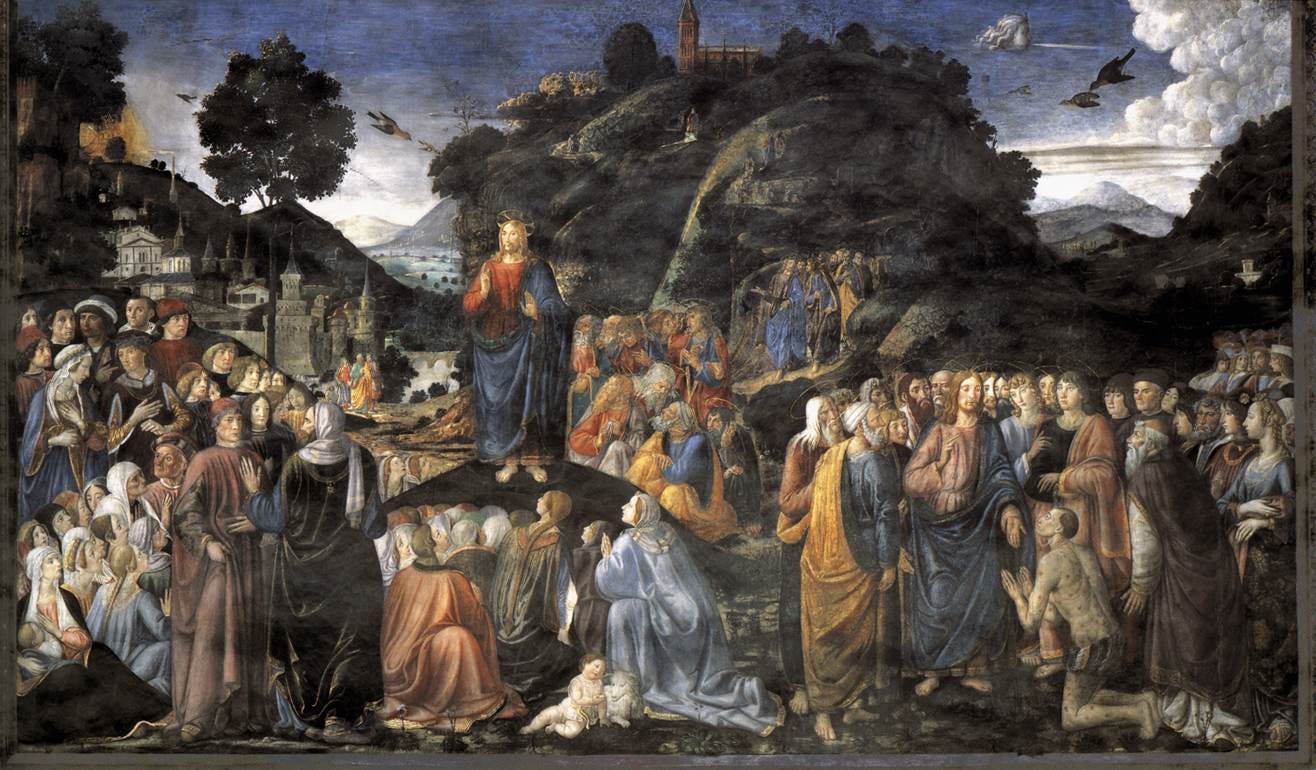St. Leo the Great - The Beatitudes
Sermons on the Beatitudes
Over the next four days, I will be sharing a series of short sermons from St. Leo the Great on the Beatitudes.
Reflection on St. Leo the Great’s Teachings on the Inner Laws of the Heart
In his sermon on the mount, Jesus begins by extolling the poor in spirit, for theirs is the kingdom of heaven. This poverty is not material but spiritual - a poverty of pride that comes through humility of soul. When our Lord withdrew to the mountain to preach, he showed that the lofty heights of the spiritual life are reached by leaving behind earthly attachments.
Christ's new covenant written on our hearts is not an exterior law imposed through fear, but an interior grace infused with love. The old law showed the terrifying justice of God, while the new law shows his compassion and transforms outward precepts into inward remedies. What was once harsh has been softened by grace, and servile fear is cast out by filial adoption.
By expounding the Beatitudes, Jesus shows the steps to blessedness. Poverty of spirit, meekness, mercy, purity of heart - these virtues cultivated on earth lead to the eternal joy of heaven. Walking the path of the Beatitudes, we follow Christ toward the kingdom.
From a sermon on the Beatitudes by Saint Leo the Great
I shall put my laws within them
Dearly beloved, when our Lord Jesus Christ was preaching the Gospel of the kingdom and healing various illnesses throughout the whole of Galilee, the fame of his mighty works spread into all of Syria, and great crowds from all parts of Judaea flocked to the heavenly physician. Because human ignorance is slow to believe what it does not see, and equally slow to hope for what it does not know, those who were to be instructed in the divine teaching had first to be aroused by bodily benefits and visible miracles so that, once they had experienced his gracious power, they would no longer doubt the wholesome effect of his doctrine. In order, therefore, to transform outward healings into inward remedies, and to cure men’s souls now that he had healed their bodies, our Lord separated himself from the surrounding crowds, climbed to the solitude of a neighboring mountain, and called the apostles to himself. From the height of this mystical site he then instructed them in the most lofty doctrines, suggesting both by the very nature of the place and by what he was doing that it was he who long ago had honored Moses by speaking to him. At that time, his words showed a terrifying justice, but now they reveal a sacred compassion, in order to fulfil what was promised in the words of the prophet Jeremiah: Behold the days are coming, says the Lord, when I shall establish a new covenant with the house of Israel and with the house of Judah. After those days, says the Lord, I shall put my laws within them and write them on their hearts.
And so it was that he who had spoken to Moses spoke also to the apostles. Writing in the hearts of his disciples, the swift hand of the Word composed the ordinances of the new covenant. And this was not done as formerly, in the midst of dense clouds, amid terrifying sounds and lightning, so that the people were frightened away from approaching the mountain. Instead, there was a tranquil discourse which clearly reached the ears of all who stood nearby so that the harshness of the law might be softened by the gentleness of grace, and the spirit of adoption might dispel the terror of slavery.
Concerning the content of Christ’s teaching, his own sacred words bear witness; thus whoever longs to attain eternal blessedness can now recognize the steps that lead to that high happiness. Blessed, he says, are the poor in spirit, for theirs is the kingdom of heaven. It might have been unclear to which poor he was referring, if after the words Blessed are the poor, he had not added anything about the kind of poor he had in mind. For then the poverty that many suffer because of grave and harsh necessity might seem sufficient to merit the kingdom of heaven.
But when he says: Blessed are the poor in spirit, he shows that the kingdom of heaven is to be given to those who are distinguished by their humility of soul rather than by their lack of worldly goods.
Let us pray.
Holy Spirit, divine Consoler, fill our hearts with the gifts of the Beatitudes. Make us poor in spirit, meek, merciful, and pure of heart. Write your laws of love upon our souls and conform our lives to the teachings of Christ, that we may one day share in his kingdom. Amen.
Reflection Questions
1. How can we, in our daily lives, embody the transition from the "terrifying justice" of the old covenant to the "sacred compassion" of Christ's teachings in the new covenant?
2. In what ways can we cultivate an authentic "humility of spirit" in a world that often prioritizes material wealth and external appearances?
3. How might we recognize and respond when God is writing His laws within our hearts, especially amidst the distractions and challenges of our contemporary world?



